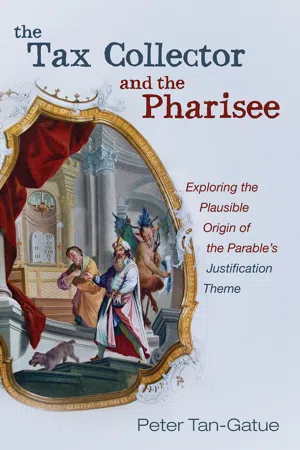![]()
Chapter 1
Introduction
Luke 18:9–14, the parable of the Pharisee and the Tax Collector is one of the singly attested Lukan parables in the Jesus tradition. One notable feature of this parable, especially when read together with Luke 18:1–8, is the concentrated use of the δικαιόω word group (i.e., ἐκδικήσω, ἀδικίας, ἐκδίκησιν, δίκαιοι, δεδικαιωμένος—18:3, 5–8, 9, 14). Interestingly, various commentators have noticed that the parable presents a theme or notion of justification/righteousness, and they often try to relate it to the Pauline idea of righteousness. For example, I. H. Marshall suggests that the picture of justification in Luke 18 (and in Acts 13:13–41) is not different from the notion depicted in Paul’s writings. He further asserts that both Paul and Luke drew from the Jesus tradition and that the variety in the way these are expressed stems from the different language used by the authors. On the other hand, John Nolland states that Luke 18:9–14 does not provide a picture of justification but instead addresses the Pharisees’ concern about their appearance before others. Therefore, he believes that this parable should not be seen through Paul’s doctrine of justification. Overall, for those who find it notable to mention the theme of justification/righteousness in this parable, they compare it to Paul’s version and then argue that they say and mean the same thing, signify something totally different, or are related in some particular way. In addition, some would conjure up different theories or assumptions about the Gospel author’s relationship to Paul, which in their view perhaps influenced the notion of justification/righteousness in the parable. For example, W. C. Van Unnik proposes that Luke’s author, as a second-generation theologian, really had no understanding of the concerns of Paul’s day and ultimately did not really comprehend the doctrine of justification by faith. He was supposedly an admirer of Paul, and he shared his view of a gospel that had done away with Jewish law. Unfortunately, he did not truly get what Paul was saying in his letters. Likewise, Joseph Fitzmyer believes that the evangelist considered Paul a hero and prominent example of the earlier generation of Christian missionaries, which was why the evangelist highlighted Paul for most of the second half of Acts. However, the Gospel of Luke presents Paul’s notion of justification as “forgiveness of sins” because the Lukan evangelist was not well informed about Pauline theology. More recently, John Meier, in his fifth volume of his series on the historical Jesus, proposes that the unique Lukan parables are creative works of the early church or by the evangelists themselves, and that the theology of justification in Luke 18:9–14 was unmistakably imported from Paul.
Did Luke the evangelist co-opt or recast this theme of justification from Paul? Is there a better likelihood that Luke derived the theme from the teachings of Jesus himself? This study is an attempt to find an answer for the second question.
Literature Review
A scarcity of scholarly works deal with the theme of justification or righteousness in Luke. Some early modern sources deal with the topic of justification in various non-Pauline biblical writings of which justification in the Gospel of Luke is but one subtopic. That is the case for F. F. Bruce’s “Justification by Faith in the Non-Pauline Writings of the New Testament” and also the work of J. H. P. Reumann, Joseph A. Fitzmyer, and Jerome D. Quinn’s Righteousness in the New Testament: Justification in the United States Lutheran-Roman Catholic Dialogue. Various other works deal with the presentation of justification by the Lukan author, specifically in the book of Acts. A monograph by Richard Gaffin about the theme of justification in the whole Bible includes a chapter on justification in Luke-Acts. Gaffin comments that “monographs and articles on the theme of justification in Luke-Acts are few indeed” and also notes that there are “numerous relevant materials in various commentaries, New Testament theologies, and monographs and articles on Lucan theology but they are not substantial.” The most recent work concerning the topic of justification in Luke is Kyle Barrett’s dissertation on justification in Lukan theology. In his work he asserts that Luke has “a conscious and detectable theology of justification which is explicit in the parable of the Pharisee and the Tax Collector, yet subtly permeates the entirety of Luke’s work.” He also claims that Luke’s understanding of justification has its foundation in the Old Testament view of God’s vindication of the righteous.
While Barrett and some of the other authors do suggest origins or sources of this theme of justification in Luke, they do not necessarily fully develop their line of thinking to support their claims in a more comprehensive manner. In addition to those who claim that Luke simply copied, reworked, or misunderstood Paul’s notion of justification, there are also those who believe that the ultimate source of the theme of justification in Luke is the Jesus tradition. An example is Joseph Fitzmyer who claims that pre-Lukan tradition was used in the parable o...
